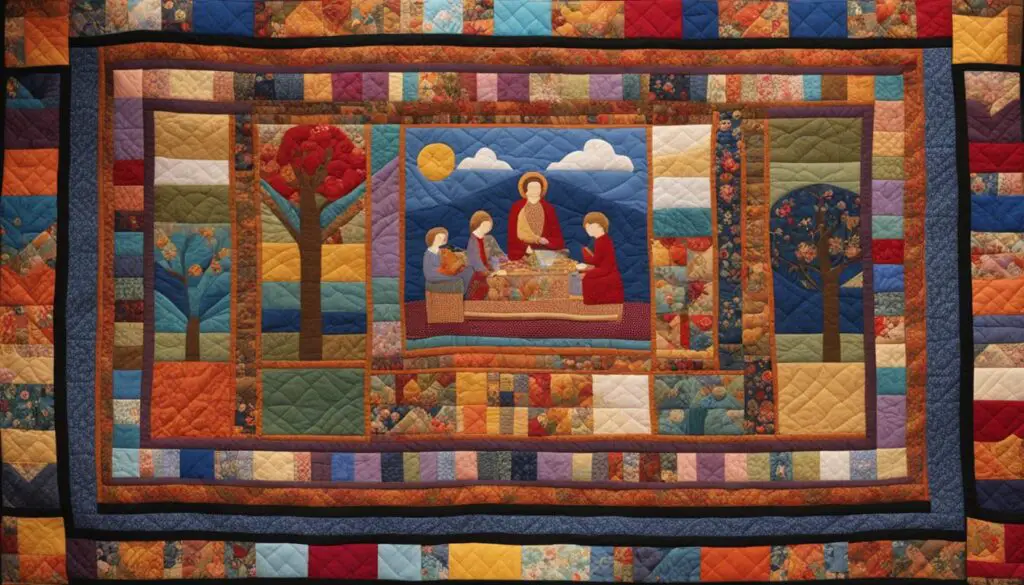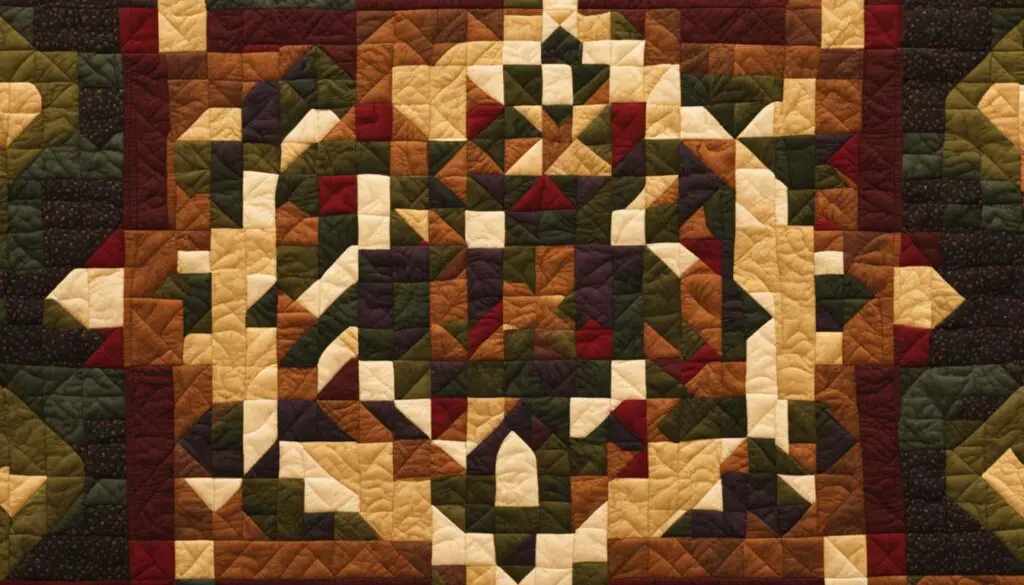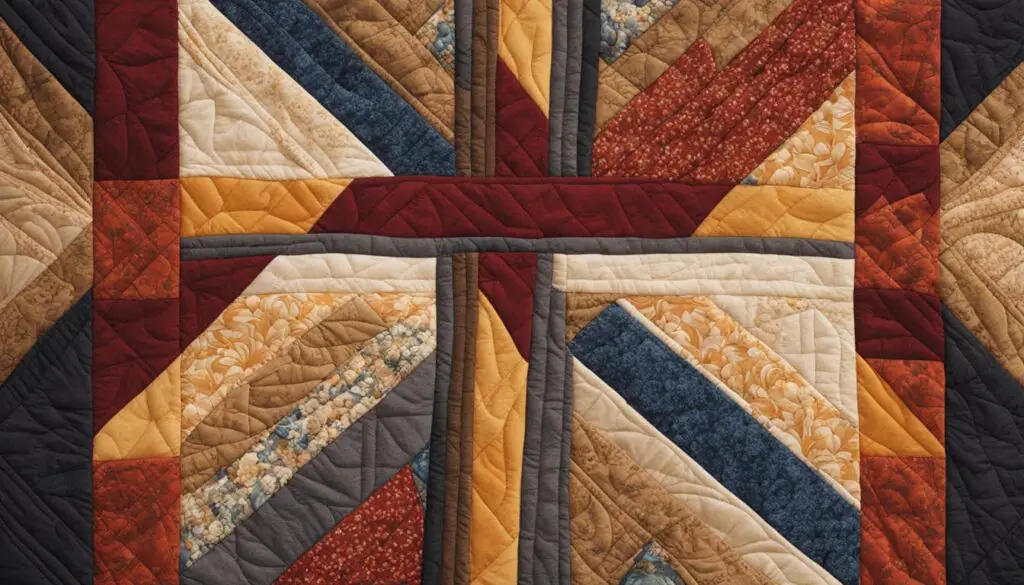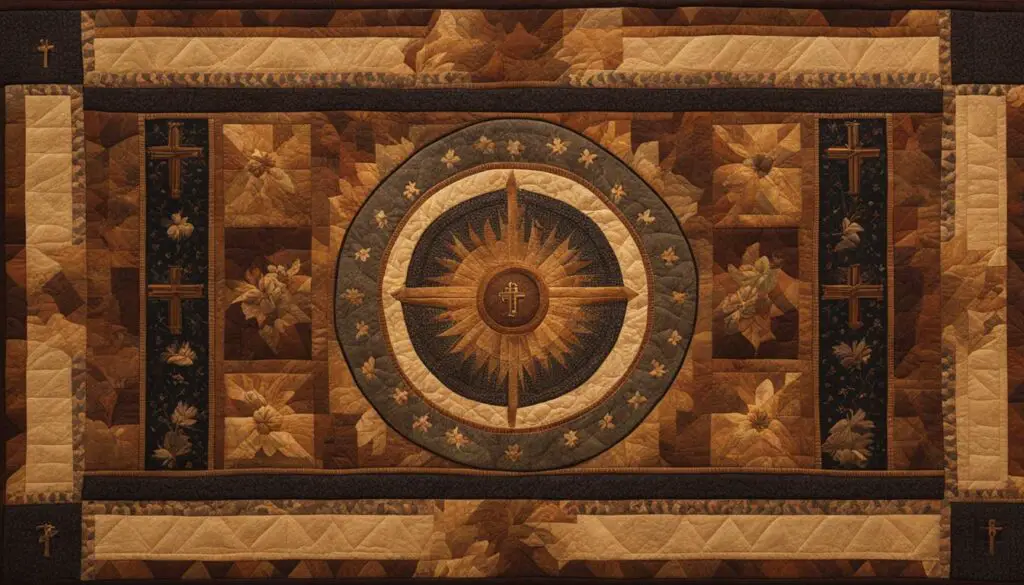The biblical definition of a quilt is closely linked to the concept of divine comfort. In both the Old and New Testaments, the idea of comfort is associated with encouragement and relief in times of need. The Hebrew word “naham” is often translated as “to comfort” in the Old Testament, emphasizing God’s role as the source of comfort. This theme is echoed in the New Testament with words like “parakaleo” and “paraklesis” used to describe comfort, which mean to call for help, encourage, and console. Comfort is seen as a gift from God, mediated through Christ and the Holy Spirit.
Key Takeaways:
- The biblical definition of a quilt is closely tied to divine comfort.
- Comfort in the Bible is associated with encouragement and relief in times of need.
- The Hebrew word “naham” and Greek words like “parakaleo” are used to describe comfort.
- Comfort is seen as a gift from God, mediated through Christ and the Holy Spirit.
- Quilts symbolize care, love, and support, reflecting the biblical understanding of comfort.
The Etymology of Comfort in the Bible
The word “comfort” has deep roots in the Latin term “comfortare,” which translates to “to strengthen greatly.” In the biblical context, comfort goes beyond providing solace; it is about imparting strength and encouragement. This concept is intricately connected to the significance of quilts in the Bible. Quilts, as handmade creations, offer physical warmth and emotional comfort. The act of quilting symbolizes care, love, and support, reflecting the biblical understanding of comfort.
Throughout the Old and New Testaments, the biblical definition of comfort is closely tied to divine assistance and support. In the Hebrew Scriptures, the primary word for comfort is “naham,” which conveys the idea of consolation, encouragement, and relief. God is often described as the ultimate comforter, providing solace and help in times of trouble. In the Greek Scriptures, the term “parakaleo” is used to describe comfort, carrying the sense of calling alongside, coming to aid, and standing by someone. Both the Hebrew and Greek references highlight God’s role as the source of comfort and the importance of divine assistance in difficult times.
“God is our refuge and strength, an ever-present help in trouble.” – Psalm 46:1 (NIV)
Mentions of Comfort in the Bible:
| Book | Verse |
|---|---|
| Isaiah | Isaiah 40:1 |
| Matthew | Matthew 5:4 |
| 2 Corinthians | 2 Corinthians 1:3-4 |
| John | John 14:16 |
The biblical significance of quilts can be seen through various stories and symbols. While there are no explicit mentions of quilts in the Bible, there are narratives that align with the concept of quilting. For instance, Joseph’s coat of many colors symbolizes love and comfort from his father, Jacob. The story of Ruth seeking the covering and protection of Boaz’s garment highlights the importance of providing warmth and care. These stories, along with the underlying significance of textile arts in biblical times, further emphasize the value of quilts as a source of comfort in the Bible.
Comfort in Hebrew and Greek Scriptures
The biblical references to comfort in both the Hebrew and Greek Scriptures highlight the role of God as the ultimate source of solace and assistance. In the Hebrew Scriptures, the primary word for comfort is “naham,” which conveys the idea of consolation, encouragement, and relief. This word emphasizes God’s role as the comforter who brings encouragement and relief in times of trouble. One of the notable references is found in Isaiah 40:1, which says, “Comfort, comfort my people, says your God.”
In the Greek Scriptures, the word used for comfort is “parakaleo,” which carries a sense of calling alongside, coming to aid, and standing by someone. This word reflects the idea of comfort as an active and supportive presence. A well-known verse that highlights this concept is 2 Corinthians 1:3-4, which states, “Blessed be the God…who comforts us in all our affliction, so that we may be able to comfort those who are in any affliction, with the comfort with which we ourselves are comforted by God.”
These biblical references emphasize the importance of seeking comfort from God and recognizing His role as the ultimate source of solace and encouragement. They also illustrate the reciprocal nature of comfort, as believers are called to extend the comfort they receive from God to others in need.

| Biblical Reference | Scripture | Type of Comfort |
|---|---|---|
| Isaiah 40:1 | Hebrew Scriptures | Consolation, encouragement, and relief |
| 2 Corinthians 1:3-4 | Greek Scriptures | Active and supportive presence |
These biblical references to comfort provide a foundation for understanding the significance of quilts in relation to divine comfort. Just as God offers solace and support to His people, quilts serve as physical manifestations of comfort, providing warmth and emotional support. The act of quilting itself can also be seen as an expression of care, love, and support, reflecting the biblical understanding of comfort as an active and tangible expression of divine assistance.
Quilts in the Bible: Stories and Symbolism
While there are no explicit mentions of quilts in the Bible, there are several stories and symbols that can be related to the concept of quilting. These narratives and symbols offer insight into the significance of quilts as a source of comfort and support in biblical times.
Ruth and Boaz: The Symbolism of Covering
One of the stories that can be associated with quilting is the tale of Ruth and Boaz. In the book of Ruth, Ruth seeks shelter under the corner of Boaz’s garment, symbolizing her desire for protection and warmth. The act of covering oneself with a garment signifies the need for comfort and security, similar to the function of a quilt. This story emphasizes the importance of providing physical and emotional warmth to those in need, a concept that is reflected in the act of quilting.
“Then Boaz said to her, ‘May you be blessed by the LORD, my daughter. You have shown more kindness now than before, because you have not pursued younger men, whether rich or poor. Now, my daughter, do not be afraid. I will do for you whatever you say, since all the people in my town know that you are a woman of noble character.’” – Ruth 3:10-11
Joseph’s Coat of Many Colors: A Symbol of Love and Comfort
Another significant symbol in the Bible that can be related to quilting is Joseph’s coat of many colors. Jacob, Joseph’s father, gifts him a coat made of different colors, demonstrating his love and favoritism. This act of creating a special garment for Joseph conveys comfort and support from a loved one. Similarly, quilts are often made with care and love, and they serve as a tangible expression of comfort and affection.
“Now Israel loved Joseph more than any of his other sons, because he had been born to him in his old age; and he made an ornate robe for him.” – Genesis 37:3
These stories and symbols showcase the significance of quilts in the Bible, highlighting their role as sources of comfort and love. Although quilts are not explicitly mentioned, the act of quilting and the symbolism surrounding textile arts serve as powerful reminders of God’s provision and the importance of offering comfort to others.
Biblical Understanding of Quilting: Insights from Scholars
Quilting holds a deep spiritual significance in the Bible, reflecting the divine love and care that God provides to humanity. Scholars and theologians have offered various interpretations of the biblical understanding of quilting, shedding light on its rich symbolism and teachings. According to their insights, quilt-making can be seen as an act of worship and a means to honor God’s creation.
“Quilts are a tangible expression of love, warmth, and support, reminding us of God’s comfort in times of need.”
These interpretations highlight the biblical emphasis on compassion and providing comfort to others. Quilt-making serves as a way to extend this comfort and support to those who may be facing challenging circumstances.
The Role of Quilting in Biblical Community
Furthermore, scholars recognize that quilting also fosters community and connection among believers. Quilting groups and charity organizations often come together to create quilts for those in need, creating a sense of unity and shared purpose. Through quilt-making, individuals can find solace, strength, and encouragement as they collaborate and support one another.
It is important to note that while the Bible does not provide specific guidelines on quilting as a practice, the biblical principles of love, compassion, and caring for others can be applied to the act of quilting. The intention and heart behind the act are more significant than adhering to specific rules or regulations.

| Insights from Scholars on Biblical Quilting | Key Teachings |
|---|---|
| Quilt-making reflects the divine love and care God provides to humanity | The importance of extending comfort and support to others |
| Quilting fosters community and shared purpose among believers | The value of unity and collaboration in serving those in need |
| Quilt-making can be seen as an act of worship and a means to honor God’s creation | The recognition of God’s creativity and provision in the world |
“Quilting not only provides physical warmth but also emotional comfort, mirroring the biblical understanding of God’s comfort.”
In conclusion, the biblical understanding of quilting emphasizes the importance of comfort, compassion, and community. Quilts serve as a tangible expression of love and support in times of need, reflecting the biblical teachings on extending God’s comfort to those around us. As believers, we can find solace and strength in the knowledge that God is the ultimate source of comfort, and quilt-making can be a way to honor Him and serve others.
Biblical Perspectives on Quilting
In exploring the biblical perspective on quilting, we find that while the Bible does not specifically address the practice of quilting, it does emphasize principles that can be applied to the act of quilting. Quilting can be seen as a way to express love, compassion, and care for others, aligning with the biblical teachings on extending comfort and support to those in need.
One biblical principle that can be applied to quilting is the command to love one another. Quilting provides an opportunity to demonstrate love by creating something tangible that brings comfort and warmth to others. As Jesus taught, “A new command I give you: Love one another. As I have loved you, so you must love one another” (John 13:34).
“Quilting provides an opportunity to demonstrate love by creating something tangible that brings comfort and warmth to others.”
Additionally, quilting can be seen as an expression of compassion, as it involves recognizing the needs of others and taking action to meet those needs. The act of quilting can bring comfort and solace to individuals facing challenging circumstances, just as God comforts us in times of trouble. As the apostle Paul wrote, “Praise be to the God and Father of our Lord Jesus Christ, the Father of compassion and the God of all comfort, who comforts us in all our troubles, so that we can comfort those in any trouble with the comfort we ourselves receive from God” (2 Corinthians 1:3-4).
The biblical perspective on quilting focuses on the intention and heart behind the act, rather than specific rules or regulations. Whether it is creating quilts for those in need, joining a quilting group to foster community, or using quilting as a form of worship, the key is to approach quilting with love, compassion, and a desire to bring comfort to others.

Quilts in Today’s World: Continuing the Tradition
Quilting has been an important tradition in many cultures throughout history, including in biblical times. The biblical understanding of quilting emphasizes the value of quilts as a symbol of comfort, love, and support. Today, the importance of quilts in providing warmth and emotional solace can still be seen, as they continue to be made and cherished in the Christian community and beyond.
The act of quilting is not just about creating a physical blanket; it is about creating a tangible expression of care and compassion. Quilting groups and charity organizations often come together to make quilts for those in need, following the biblical teachings on providing comfort. These quilts serve as a powerful reminder of the divine comfort that God offers and the call for believers to extend that comfort to others.
“Quilting is a way to bring warmth, comfort, and love to others. It is a tangible expression of our faith and a means to honor God’s creation.”
Today’s world can be challenging, with many individuals facing difficult circumstances and needing comfort. Quilts offer a physical reminder of warmth and support, providing both practical and emotional relief. Through the act of quilting, we can continue the biblical tradition of offering comfort to those in need, spreading love and compassion in our communities.

“The act of quilting is a way to extend God’s comfort to others and continue the tradition of compassion and care.”
Different Opinions on the Biblical Significance of Quilts
When exploring the biblical significance of quilts, there may be different opinions regarding the specific symbolism and importance attached to them. While there are no explicit references to quilts in the Bible, the act of quilting and the concept of comfort are deeply rooted in biblical teachings. Some individuals may emphasize the practical aspects of quilting, such as providing warmth and protection, while others may delve into deeper spiritual meanings.
Quilts can be seen as a tangible expression of love and support, reflecting the biblical principles of compassion and empathy. They can serve as a comforting reminder of God’s presence and care in difficult times. Additionally, quilting groups and charity organizations often create quilts to donate to those in need, embodying the biblical call to serve others and show kindness.
The diversity of opinions surrounding the biblical significance of quilts highlights the richness and depth of interpretation within the Christian community. It is important to respect and appreciate these different perspectives, recognizing that the essence of quilting lies in its ability to bring comfort and unity, regardless of varying individual understandings. Ultimately, the biblical understanding of quilts invites us to extend compassion, love, and support to others, embodying the divine comfort that we have experienced in our own lives.

Quilting Perspectives in the Bible:
| Opinions | Explanation |
|---|---|
| The Practical Perspective | Some individuals focus on the practical aspects of quilting, emphasizing the warmth, protection, and physical comfort that quilts provide. They view quilts as a tangible expression of care and love. |
| The Symbolic Perspective | Others approach quilting from a symbolic perspective, seeing quilts as a representation of unity, community, and divine comfort. They view quilting as a way to bring people together and foster a sense of belonging. |
| The Spiritual Perspective | There are those who delve into the spiritual aspects of quilting, connecting it to biblical teachings on compassion, service, and the divine presence. They see quilts as a means of manifesting God’s love and care for humanity. |
Conclusion
The biblical understanding of quilts is closely tied to the concept of divine comfort. While there are no direct references to quilts in the Bible, the act of quilting and the symbolism of warmth, protection, and care align with the biblical understanding of God’s comfort. Quilts serve as a tangible expression of love and support in times of need, reflecting the biblical teachings on compassion and providing comfort to others.
As believers, we can find solace and strength in the knowledge that God is the ultimate source of comfort and that we are called to extend that comfort to those around us. Throughout the Bible, numerous references highlight God’s role as the ultimate comforter, offering solace and help in times of trouble. We are encouraged to follow this example and be a source of comfort to others, just as God provides comfort to us.
Quilting has a rich history and continues to be a cherished tradition in many cultures, including the Christian community. Today, quilts are often made to provide both physical warmth and emotional support to individuals facing challenging circumstances. Quilting groups and charity organizations create quilts to donate to those in need, embodying the biblical understanding of comfort and the act of giving.
While there may be different interpretations and opinions regarding the specific symbolism and significance of quilts in the Bible, the overarching theme of comfort and care remains constant. The biblical references to quilts, along with the significance of comfort, love, and support found in quilt-making, teach us profound lessons about God’s character and our role in extending comfort to those around us.
FAQ
What is the biblical definition of a quilt?
The biblical definition of a quilt is closely tied to the concept of divine comfort. It is associated with encouragement, relief, and strength in times of need. While there are no direct references to quilts in the Bible, the act of quilting and the symbolism of warmth, protection, and care align with the biblical understanding of God’s comfort.
Are there any specific mentions of quilts in the Bible?
No, there are no explicit mentions of quilts in the Bible. However, there are stories and symbols related to the concept of quilting, such as Joseph’s coat of many colors and the act of covering oneself with a garment, which emphasize the importance of providing love, protection, and warmth.
How do quilts symbolize comfort in the Bible?
Quilts symbolize comfort in the Bible through their handmade creation, which reflects care, love, and support. The act of quilt-making is seen as a way to provide physical warmth and emotional comfort, aligning with the biblical understanding of comfort as both solace and strength. Quilts serve as a tangible expression of God’s love and support in times of need.
What do scholars say about the biblical understanding of comfort and quilting?
Scholars offer various interpretations of the biblical understanding of comfort and its connection to quilting. Some suggest that quilt-making reflects the divine love and care provided by God, while others focus on the symbolism of quilts in fostering community and honoring God’s creation. Quilting can also be seen as a form of worship and a means to express love and support for others.
Does the Bible provide specific guidelines on quilting as a practice?
No, the Bible does not provide specific guidelines or teachings on quilting as a practice. However, the biblical principles of love, compassion, and caring for others can be applied to the act of quilting. The focus is on the intention and heart behind the act of quilting, rather than specific rules or regulations.
How are quilts valued in today’s world?
Quilts continue to be cherished traditions in many cultures, including the Christian community. They are often made to provide physical warmth and emotional support to individuals facing challenging circumstances. Quilting groups and charity organizations create quilts to donate to those in need, reflecting the biblical understanding of comfort and the act of giving.
Are there different opinions on the significance of quilts in the Bible?
Yes, there may be different opinions on the specific symbolism and significance of quilts in the Bible. Some individuals may focus more on the practical aspects of quilting, such as providing warmth and protection, while others may see deeper spiritual meanings. It is important to recognize and respect different interpretations and perspectives on the biblical understanding of quilts.








Leave a Reply